- Home
- J. T. Edson
The Floating Outfit 61
The Floating Outfit 61 Read online
The Home of Great Western Fiction!
WANTED – DEAD
$5000
It might have been the normal poster put out by a law enforcement office that the Ysabel Kid held out, until the others read the name of the wanted man – Dusty Fog!
“For five thousand dollars, every bounty hunter and two-bit gun slick west of the Pecos’ll be after your hide,” the Kid growled.
“What do you aim to do about it?” Doc enquired.
“Stop them,” answered Dusty Fog.
THE FLOATING OUTFIT 61: RETURN TO BACKSIGHT
By J. T. Edson
First published by Brown Watson Publishers in 1966
Copyright © 1966, 2021 by J. T. Edson
First Electronic Edition: July 2021
Names, characters and incidents in this book are fictional, and any resemblance to actual events, locales, organizations, or persons living or dead is purely coincidental.
You may not copy, store, distribute, transmit, reproduce or otherwise make available this publication (or any part of it) in any form, or by means (electronic, digital, optical, photocopying, recording or otherwise), without the prior written permission of the publisher. Any person who does any unauthorized act in relation to this publication may be liable to criminal prosecution and civil claims for damages.
This is a Piccadilly Publishing Book
Series Editor: Ben Bridges
Text © Piccadilly Publishing
Published by Arrangement with the Author’s Agent.
For W.O. II Sam Perrie, R.A.V.C. – The Noblest Dog Man of All
Publisher’s Note:
As with other books in this series, the author uses characters’ native dialect to bring that person to life. Whether they speak French, Irish, American English or English itself, he uses vernacular language to impart this.
Therefore when Scottish characters use words such as “richt” instead of “right”; “laird” for “lord”; “oopstairs” for “upstairs”; “haim” for “home”; “ain” for “own”; “gude sores” for “good sirs” and “wha” for who” plus many other phrases, please bear in mind that these are not spelling/OCR mistakes.
Chapter One – Father Donglar’s Scheme
IT COULD NOT be claimed that everybody in the Arizona Territory Penitentiary favored the scheme put forward by Father Donglar.
“A musical evening for the prisoners,” spat out one of the main-gate guards disgustedly. “They’ll be having us serve ’em with breakfast in bed next.”
“Back East there’s a bunch of them college-boy politicians reckon we ought to treat our prisoners kinder,” his companion replied. “Make ’em comfortable, don’t give ’em any hard work. That way they’ll not do anything bad again. Some of that bunch even reckon we shouldn’t hang murderers, want it stopping.”
“Nobody could be that stupid,” growled the first, then a worried expression crept to his face. “Or could they?”
“You’d think not,” the second answered. “It’ll be God help the world if they do get their way.”
Seated behind the desk in his office, the Warden studied his visitor with some interest. Tall, tanned, handsome, with light brown hair and pale blue eyes, the man called Father Donglar made a striking figure in the black clothing of his order. Smiling in a friendly manner, he waited for the Warden to speak.
“You want to bring a show in here, Father?” asked the Warden, after glancing at the letter of introduction which lay before him.
“Not exactly a show, Warden,” the other replied. “An entertainment. There will be no girls in scanty costumes showing their legs. No comedian making risqué jokes—and don’t look so surprised. I do know such things exist.”
From the twinkle in Father Donglar’s eyes, the Warden decided that, regardless of his cloth, he was not entirely averse to seeing the kind of show he mentioned. Clearly the Father took a broader and more tolerant outlook than many of his kind. The Warden found himself warming towards his visitor.
“I reckon you do, sir.”
“What we offer is an entertainment of a light, but serious tone.”
“It’s a mite unusual.”
“It is simple humanity. We want to bring a touch of relief into your prisoners’ hard lives.”
“I don’t know that I’m employed to make life easier for them,” the Warden pointed out. “They’re as prime a collection of cut-throats as you could find in the world penned up here. No matter what your intellectual friends tell you, Father, the law doesn’t very often make a mistake and send an innocent man to jail.”
“I’m not exactly unaware of the existence of sin,” the black clad man said gently.
“Reckon not. But I didn’t want you forgetting that you’re dealing with criminals.” .
“Who are also human beings.”
“There’s some folks who’d give you an argument about that over most of the prisoners in here.”
“Don’t get me wrong, Warden,” Donglar put in hurriedly. “I’m not one of these dreamy-eyed ideologists who invests every thief with a shroud of martyrdom. I know that most men take to crime because they are too damned idle to work, and that nothing will make that kind change for the better. However, there are a few who might be redeemable. You look surprised.”
A guilty look flickered on the Warden’s face. Having prided himself upon possessing a face which hid his thoughts, he felt surprised at Father Donglar’s last words.
“I just never thought to hear you say that, Father.”
“Why? Because I came here proposing a small entertainment for the inmates.”
“Sure. When I got your first letter, I thought—” The Warden’s words trailed off, unsure of how to continue without giving offence.
“You thought, ‘Here’s another of those fools,’” smiled Donglar. “I do confess there are aspects of prison life I would like to see changed. So would you, Warden. I have heard something of your liberal attitudes.”
“I even tried them out; and was sold down the river by the men who I trusted and tried to help. It taught me one thing. Never trust any prisoner.”
“You have no trusties here then?”
“Sure, some. But that doesn’t mean I’d give them the keys to the main gates, or trust them out of my sight.”
“You won’t stop my little entertainment though?”
“With that letter you brought from the Governor?” grinned the Warden. “All I do is reserve the right to take precautions.”
“Such as?”
“Selecting which prisoners can attend—and posting guards.”
“If you believe that to be necessary, go ahead.”
“I do, Father.”
“Then you’ll have no objections from me.”
Having come into contact with numerous other “reformers,” most of whom appeared to regard the Warden and guards as their enemies, the head of the Penitentiary had not expected such co-operation. Receiving it made him less inclined to object to his visitor’s scheme.
“When will you give your sh—entertainment?”
“Tomorrow evening, if we may.”
“Feel free. Have you everything you need?”
“Everything but somewhere to seat our audience and make a small stage.”
“There’s only one place,” the Warden declared. “That big building down by the main gates. It holds our wagons, but they can come out for the night.”
“May I look it over?” Donglar asked.
“Sure,” agreed the Warden, rising. “I’ll take you over there right now.”
Leaving the office block, the Warden escorted his visitor across an open square to the big wooden building standing at the left of the Gatling gun-guarded main gates.
“I see
you have female prisoners here,” Donglar remarked as the Warden unlocked the building’s double doors.
Turning, the Warden followed the direction of Donglar’s gaze. A woman came from one of the doors in the next building, emptied a bucket into a barrel close by and stood for a moment studying the visitor. She was tall, with blonde hair cut almost boyishly short in accordance with regulations. Good looking, her face held a haughty expression one would not expect to see on a woman in her position. The long white coat she wore was open and showed a full, buxom, yet shapely figure. As prison regulations forbade the wearing of corsets, her waist must slim down naturally, for it curved in under the full bosom and rose out to rounded hips. Even in the rough gray prison dress, she looked a fine figure of womanhood. After the one glance, the woman returned through the door from which she emerged.
“We’ve a few here,” the Warden admitted. “I don’t like it, but the Territory can’t afford to run a separate penitentiary for women. Not that there’s any real need. A woman has to be real bad before any Arizona court’ll send her here.”
“Will you allow them to see the entertainment?”
“I don’t reckon it’d be wise. The men don’t see or get near a woman all through their sentence and I wouldn’t want to stir them up by putting the female prisoners close to them.”
“A wise decision.”
Opening the double doors, the Warden stood aside to let his visitor enter the building. Several strongly made prison wagons stood in the large room, the remainder being taken up by sledgehammers, picks, shovels and other tools. At the far end a smaller door offered an alternative exit.
“Perfect,” said Father Donglar. “Can we have access through the rear door?”
“I’ll have it unlocked.”
“Then we’ll screen off the far end and the performers can make their entrances through the rear door. We’ll have our wagon just outside, that will keep us clear of the main part of the prison.”
Once again the Warden found himself admiring his visitor’s grasp of the situation and willingness to co-operate. While a humanitarian, the priest was no fool and did not aim to put his party in a position where they might be grabbed by a bunch of desperate prisoners and used as hostages. In view of what he had seen and heard, the Warden reckoned he would do all he could to make the entertainment a success.
“I can’t run to fancy curtains, Father,” he warned. “But I’ll have a couple of the trusties hang some tarps that’ll be almost as good—if not as dressy.”
“Why, thank you, Warden.”
“Just give us a good show tomorrow.”
“I think I can safely promise you that.”
Soon after, the Warden stood by the main gates and watched his visitor ride off in the direction of the town of Yuma. Studying the way Donglar sat the big, powerful bay horse, the Warden could see that the other knew how to ride. Clearly, Father Donglar was a man of many talents.
Next day, shortly before sundown, the priest returned accompanied by a two-horse wagon driven by a gaunt, elderly man dressed in sober black. At the driver’s side sat a tall, shapely, beautiful young woman. Shoulder long black hair hung from under her rather severe hat. While her clothes tried to hide the fact, she showed signs of being very shapely in the large style fashionable at that time. Behind the young woman stood a middle-aged man with a sun-reddened face—in other company, the Warden might have guessed at a different cause for the reddening.
“We have run into a little trouble, Warden,” the priest announced as he handed the bay’s reins to one of the waiting guards. “Perhaps you can help?”
“Try me and see, Father,” the Warden answered.
“It’s Miss Garfield’s maid. The foolish girl refused to come out here, even though we tried to convince her there was no danger.”
“How does that affect me?”
“We’ve found when doing these entertainments that the effect is better if Miss Garfield appears dressed well. She makes a rather fast change of clothing at one point and needs the assistance of her maid.”
“How can I help?” asked the Warden.
“By allowing one of your female prisoners to act as the maid.”
“You know what kind of women come in here, Father?” the Warden growled. “Bad Mexicans, Apaches, white trash of the worst kind. I couldn’t let a for-real lady like Miss Garfield come into contact with them.”
“How about the one I saw yesterday?” asked the priest. “I thought that she looked a woman of breeding.”
“Who, Considine?” the Warden answered. “Well, she’s not like the other women here, and that’s for sure. They’re stupid and bad. She’s smart, intelligent, well-bred.”
“Then why is she in here?”
“She and her mother were working a real smart game up Backsight way. At that time there wasn’t much of a town. The Territorial Land Office put land up for sale on a develop-or-lose-the-deposit contract. Her brother ran the Land Office in Backsight, and she made sure that the folks who paid the deposit never made good on the contract. She killed two men and had a few more killed before she was stopped.”
“And who stopped her?”
“That Rio Hondo gun-wizard, Dusty Fog. She was trying to stop the Raines’ wagon-train getting through. Captain Fog happened along, took over the train and bust up the game. i Her brother was killed, she took lead herself. Drew a life sentence at her trial. That was almost four years back. She’d’ve hung, only being a woman saved her.”
“What kind of a prisoner is she?” asked the priest.
“Behaves well. I made her a trusty and she helps the doctor. Maybe she’d lend Miss Garfield a hand if we asked her.”
“We can but try.”
After telling one of the guards to show the driver where to take his wagon, the Warden took Donglar across the exercise yard and into the small building used as a combined surgery and hospital.
“We don’t keep Considine with the other women,” the Warden explained. “She has a room at the end of the building.” He pointed to a door at the end of the passage and the key which hung on a hook alongside it. “Only time the door’s locked is at night and the key’s always there. Happen there’s doctoring work after dark, well, the doc’s not always able to handle it, so the guard knocks to wake Considine and lets her out. She’s good at doctoring now, the prisoners’d rather have her than the doctor tend to them. When she’s finished, she goes back to her room and slams the door. It has a spring lock.”
“It seems that one of your prisoners respects your trust, Warden,” smiled Donglar.
“It looks that way,” agreed the Warden and knocked on the door. When the woman opened it, he went on, “Father Donglar here needs your help, Considine.”
Cold eyes studied the priest as he made his request, then she nodded her head. “Of course I’ll help, Warden. I’m tired though, the doctor was—indisposed—last night and I didn’t get much sleep through looking after one of the inmates.”
“Miss Garfield only needs help to change into the second dress. She’ll have time to attend to herself after that,” Father Donglar explained.
“You can go straight back to your room after you’ve helped,” the Warden continued. “It’s all settled then.”
“Come with me, Miss Considine,” the priest said and walked towards the wagon at the woman’s side, leaving the Warden to go and organize the delivery of the audience.
Although working under primitive conditions, the show passed without any major hitches and was well-received by the men selected to attend. Being unsure of how the prisoners would react, and not wishing to have any trouble arise from allowing his inmates to come into such close contact with people from the outside, the Warden told every available guard to be present. In addition, all but the duty matron of the female staff attended the entertainment, grabbing a chance to make a change from the monotony and risks of their working life.
At last the entertainment ended and the prisoners filed back to the grim, forbidding cell
blocks. Joining the priest’s party, the Warden thanked them for what had been a much better show than he, secretly, expected.
“Did Considine do all right, Miss Garfield?” he asked.
“She helped me perfectly,” the young woman replied. “After she finished, I asked her to see the show, but she said she felt tired and went to that building over there. If you’ll excuse me, Warden, I’ll change for the trip back to town.”
Before he could answer, the girl climbed into the rear of the wagon and dropped the covers. The Warden had planned to search the wagon before it left, knowing the ingenuity prisoners showed in their attempts to escape, but the girl’s entrance prevented him giving the order. As no scream or other sound came, he concluded that none of the inmates had in some manner secreted themselves aboard the wagon. So he turned to the priest and started to offer an invitation.
“I hope you’ll all be my guests before—”
The words chopped off as a roaring noise rose from one of the cell blocks. Instantly the Warden swung to face the sound, his right hand going under his jacket to where a Merwin and Hulbert Army pocket revolver hung in a shoulder holster.
“Riot!” bellowed a guard’s voice.
More shouting, clatters and crashes rose from the other cell blocks as the prisoners caught the infection and added their quota to the tumult. Racing across the exercise yard, a guard halted at the Warden’s side.
“Trouble in Twenty-one, Warden!” he reported. “It looks bad!”
“I’ll be right over.”
At that moment, one of the female compound’s matrons came up. “The women’ve heard it, Warden. They’re getting stirred up. We can hold them, but it’ll take all of us.”
“Try to control it yourselves,” the Warden answered, then looked at Father Donglar’s party. “I reckon you’d best get your folks out of here, Father. The situation’s dangerous, and this’ll be no place for a lady.”
For an awful, worrying moment the Warden thought that the priest would ask to be taken to the rioters so that he could reason with them. Having seen more than one prison riot, the Warden knew that such attempts seldom brought any results and not infrequently presented the rioters with an opportunity of laying hands upon a useful bargaining piece in the form of a hostage. Then the worry passed as Father Donglar once more showed his grasp of the facts of life.

 Calamity Jane 11
Calamity Jane 11 The Floating Outift 33
The Floating Outift 33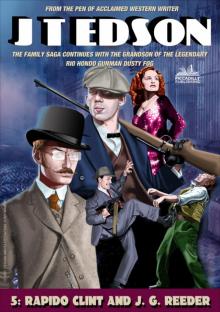 Cap Fog 5
Cap Fog 5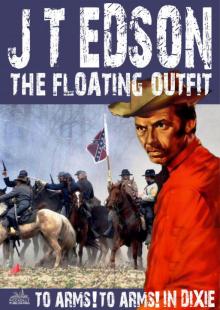 The Floating Outfit 34
The Floating Outfit 34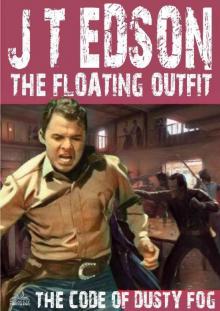 The Code of Dusty Fog
The Code of Dusty Fog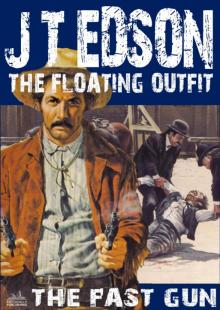 The Floating Outfit 21
The Floating Outfit 21 The Floating Outift 36
The Floating Outift 36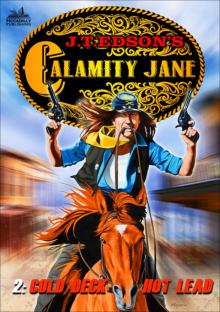 Calamity Jane 2
Calamity Jane 2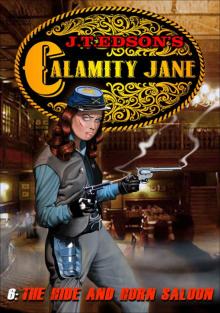 Calamity Jane 6: The Hide and Horn Saloon (A Calamity Jane Western)
Calamity Jane 6: The Hide and Horn Saloon (A Calamity Jane Western) Waco 7
Waco 7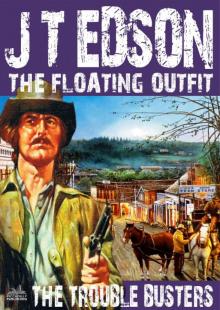 The Floating Outfit 25
The Floating Outfit 25 Waco 7: Hound Dog Man (A Waco Western)
Waco 7: Hound Dog Man (A Waco Western) The Floating Outfit 47
The Floating Outfit 47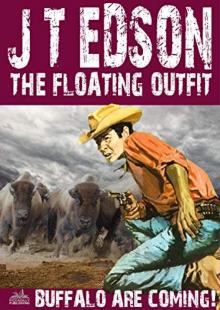 The Floating Outfit 42: Buffalo Are Coming!
The Floating Outfit 42: Buffalo Are Coming! The Floating Outfit 46
The Floating Outfit 46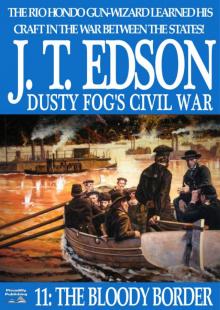 Dusty Fog's Civil War 11
Dusty Fog's Civil War 11 The Floating Outfit 61
The Floating Outfit 61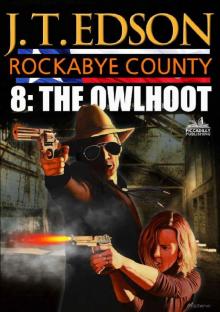 The Owlhoot
The Owlhoot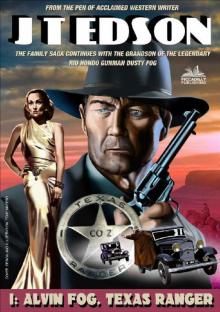 Alvin Fog, Texas Ranger
Alvin Fog, Texas Ranger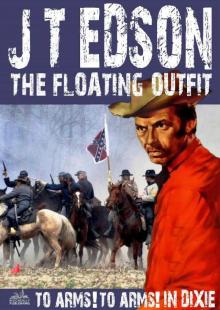 The Floating Outfit 34: To Arms! To Arms! In Dixie! (A Floating Outfit Western)
The Floating Outfit 34: To Arms! To Arms! In Dixie! (A Floating Outfit Western) The Floating Outfit 44
The Floating Outfit 44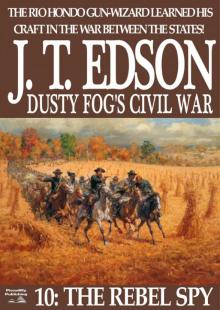 Dusty Fog's Civil War 10
Dusty Fog's Civil War 10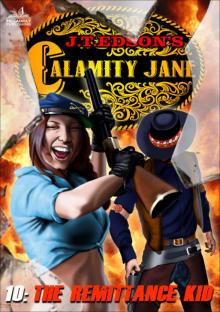 Calamity Jane 10
Calamity Jane 10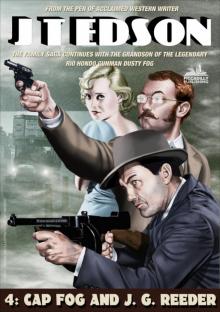 Cap Fog 4
Cap Fog 4 The Floating Outfit 51
The Floating Outfit 51 The Floating Outfit 50
The Floating Outfit 50 The Floating Outfit 49
The Floating Outfit 49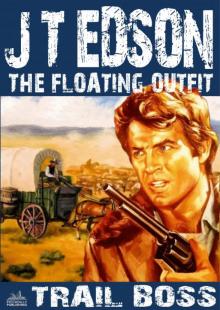 The Floating Outfit 10
The Floating Outfit 10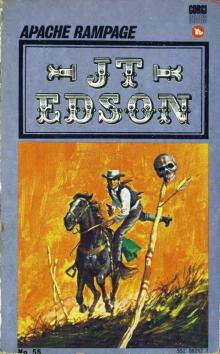 Apache Rampage
Apache Rampage The Floating Outfit 15
The Floating Outfit 15 Ranch War
Ranch War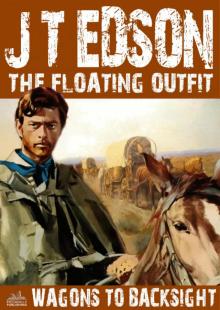 The Floating Outfit 11
The Floating Outfit 11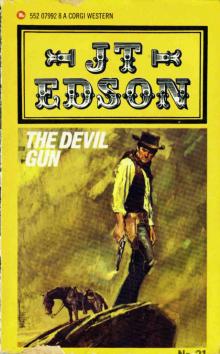 The Devil Gun
The Devil Gun Sacrifice for the Quagga God (A Bunduki Jungle Adventure Book 3)
Sacrifice for the Quagga God (A Bunduki Jungle Adventure Book 3) Comanche (A J.T. Edson Western Book 1)
Comanche (A J.T. Edson Western Book 1) The Floating Outfit 48
The Floating Outfit 48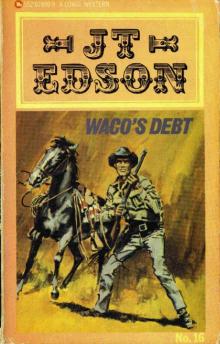 Wacos Debt
Wacos Debt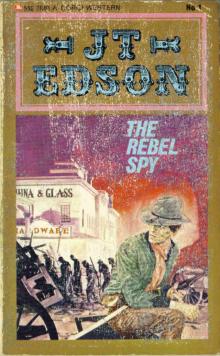 The Rebel Spy
The Rebel Spy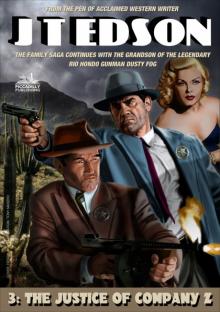 Cap Fog 3
Cap Fog 3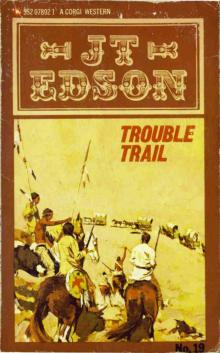 Trouble Trail
Trouble Trail Cold Deck, Hot Lead
Cold Deck, Hot Lead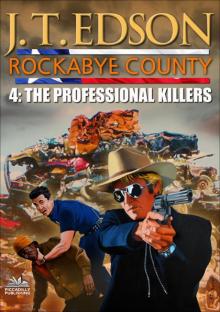 Rockabye County 4
Rockabye County 4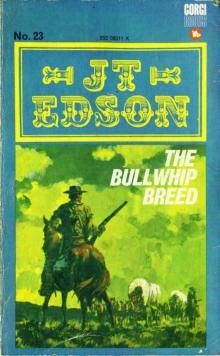 The Bullwhip Breed
The Bullwhip Breed Set Texas Back On Her Feet (A Floating Outfit Western Book 6)
Set Texas Back On Her Feet (A Floating Outfit Western Book 6)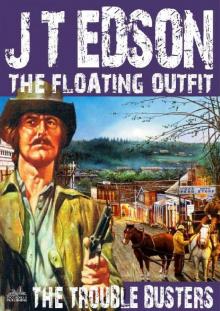 The Floating Outfit 25: The Trouble Busters (A Floating Outfit Western)
The Floating Outfit 25: The Trouble Busters (A Floating Outfit Western) Fearless Master of the Jungle (A Bunduki Jungle Adventure
Fearless Master of the Jungle (A Bunduki Jungle Adventure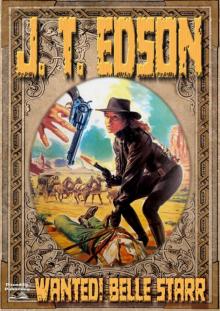 Wanted! Belle Starr!
Wanted! Belle Starr! The Big Hunt
The Big Hunt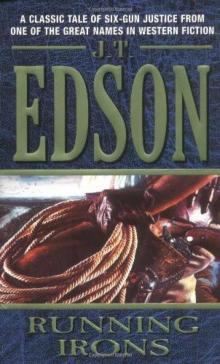 Running Irons
Running Irons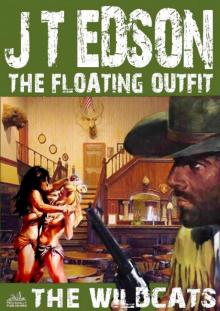 The Floating Outfit 19
The Floating Outfit 19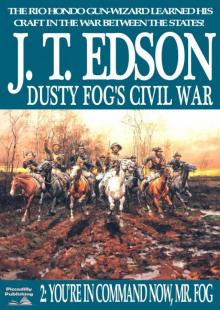 You're in Command Now, Mr Fog
You're in Command Now, Mr Fog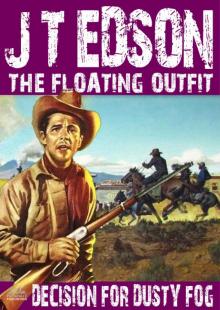 The Floating Outfit 27
The Floating Outfit 27 Texas Killers
Texas Killers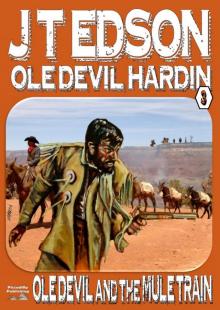 Ole Devil and the Mule Train (An Ole Devil Western Book 3)
Ole Devil and the Mule Train (An Ole Devil Western Book 3) Bunduki and Dawn (A Bunduki Jungle Adventure Book 2)
Bunduki and Dawn (A Bunduki Jungle Adventure Book 2)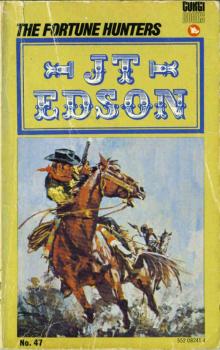 The Fortune Hunters
The Fortune Hunters The Floating Outfit 12
The Floating Outfit 12 The Hide and Tallow Men (A Floating Outfit Western. Book 7)
The Hide and Tallow Men (A Floating Outfit Western. Book 7)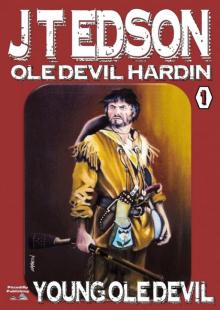 Young Ole Devil
Young Ole Devil Slip Gun
Slip Gun The Drifter
The Drifter The Floating Outfit 45
The Floating Outfit 45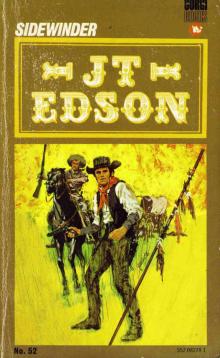 Sidewinder
Sidewinder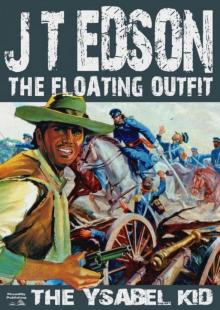 The Ysabel Kid
The Ysabel Kid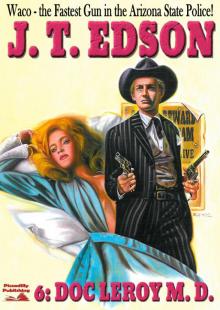 Waco 6
Waco 6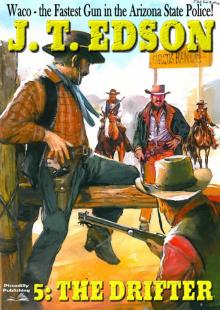 Waco 5
Waco 5 Point of Contact
Point of Contact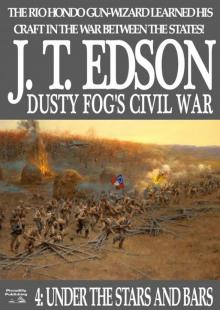 Under the Stars and Bars (A Dusty Fog Civil War Western Book 4)
Under the Stars and Bars (A Dusty Fog Civil War Western Book 4)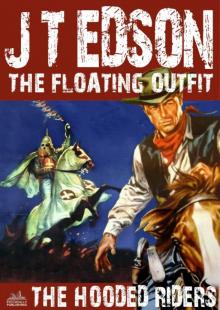 The Floating Outfit 9
The Floating Outfit 9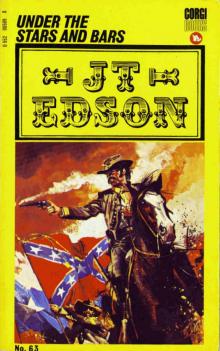 Under the Stars and Bars
Under the Stars and Bars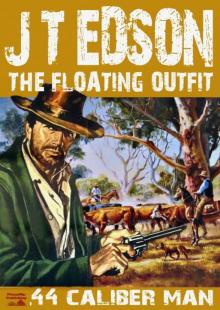 .44 Caliber Man
.44 Caliber Man The Floating Outfit 17
The Floating Outfit 17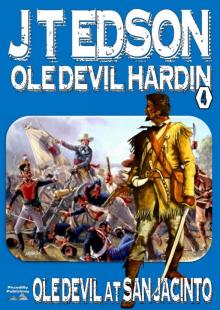 Ole Devil at San Jacinto (Old Devil Hardin Western Book 4)
Ole Devil at San Jacinto (Old Devil Hardin Western Book 4)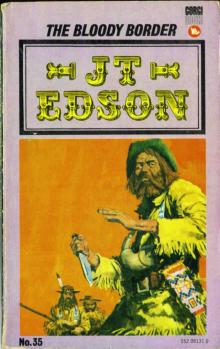 The Bloody Border
The Bloody Border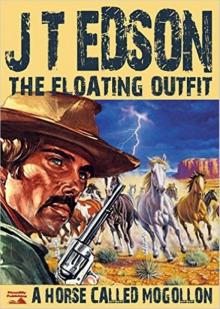 A Horse Called Mogollon (Floating Outfit Book 3)
A Horse Called Mogollon (Floating Outfit Book 3)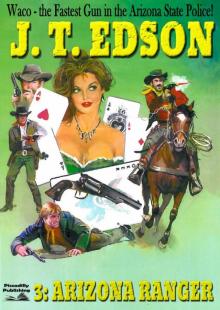 Waco 3
Waco 3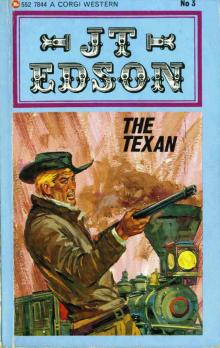 The Texan
The Texan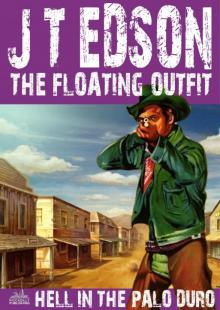 The Floating Outfit 35
The Floating Outfit 35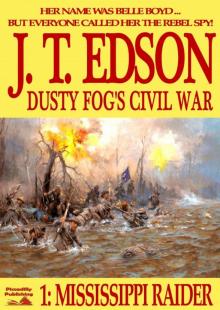 Mississippi Raider
Mississippi Raider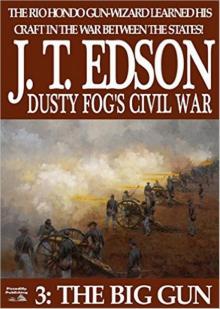 The Big Gun (Dusty Fog's Civil War Book 3)
The Big Gun (Dusty Fog's Civil War Book 3)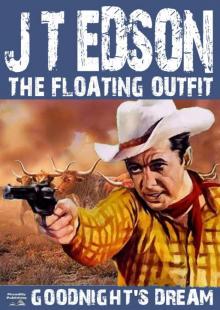 Goodnight's Dream (A Floating Outfit Western Book 4)
Goodnight's Dream (A Floating Outfit Western Book 4) Waco 4
Waco 4 From Hide and Horn (A Floating Outfit Book Number 5)
From Hide and Horn (A Floating Outfit Book Number 5)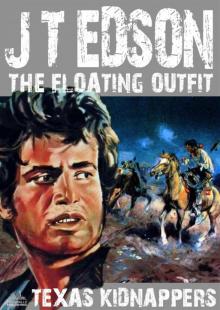 The Floating Outfit 18
The Floating Outfit 18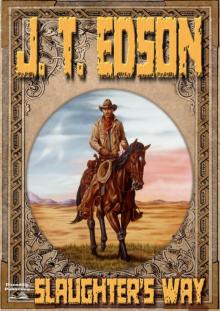 Slaughter's Way (A J.T. Edson Western)
Slaughter's Way (A J.T. Edson Western)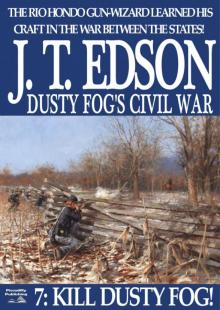 Dusty Fog's Civil War 7
Dusty Fog's Civil War 7 Two Miles to the Border (A J.T. Edson Western)
Two Miles to the Border (A J.T. Edson Western)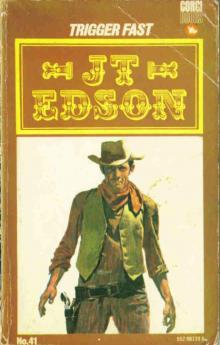 Trigger Fast
Trigger Fast Waco's Badge
Waco's Badge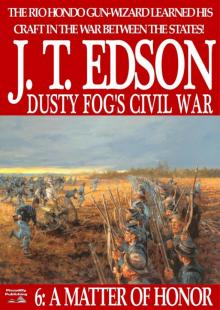 A Matter of Honor (Dusty Fog Civil War Book 6)
A Matter of Honor (Dusty Fog Civil War Book 6)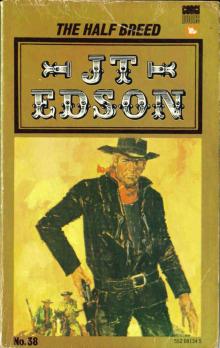 The Half Breed
The Half Breed Bunduki (Bunduki Series Book One)
Bunduki (Bunduki Series Book One)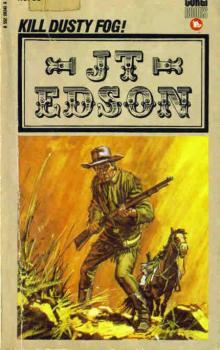 Kill Dusty Fog
Kill Dusty Fog Get Urrea! (An Ole Devil Hardin Western Book 5)
Get Urrea! (An Ole Devil Hardin Western Book 5)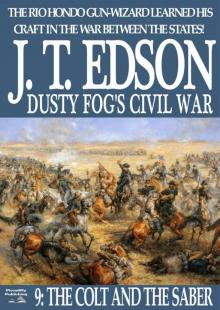 Dusty Fog's Civil War 9
Dusty Fog's Civil War 9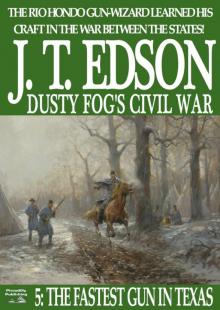 The Fastest Gun in Texas (A Dusty Fog Civil War Book 5)
The Fastest Gun in Texas (A Dusty Fog Civil War Book 5)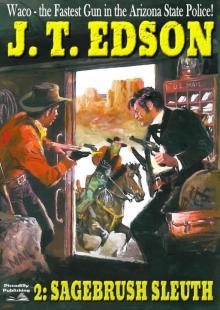 Sagebrush Sleuth (A Waco Western #2)
Sagebrush Sleuth (A Waco Western #2)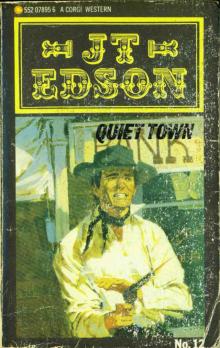 Quiet Town
Quiet Town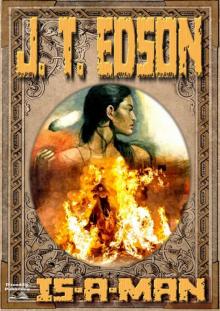 Is-A-Man (A J.T. Edson Standalone Western)
Is-A-Man (A J.T. Edson Standalone Western) Rockabye County 5
Rockabye County 5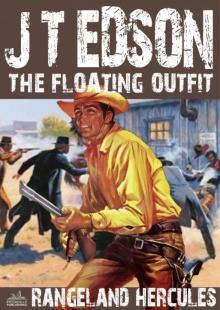 The Floating Outfit 14
The Floating Outfit 14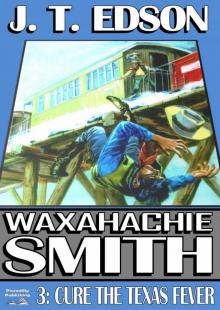 Cure the Texas Fever (A Waxahachie Smith Western--Book 3)
Cure the Texas Fever (A Waxahachie Smith Western--Book 3) The Floating Outfit 13
The Floating Outfit 13 The Road to Ratchet Creek
The Road to Ratchet Creek